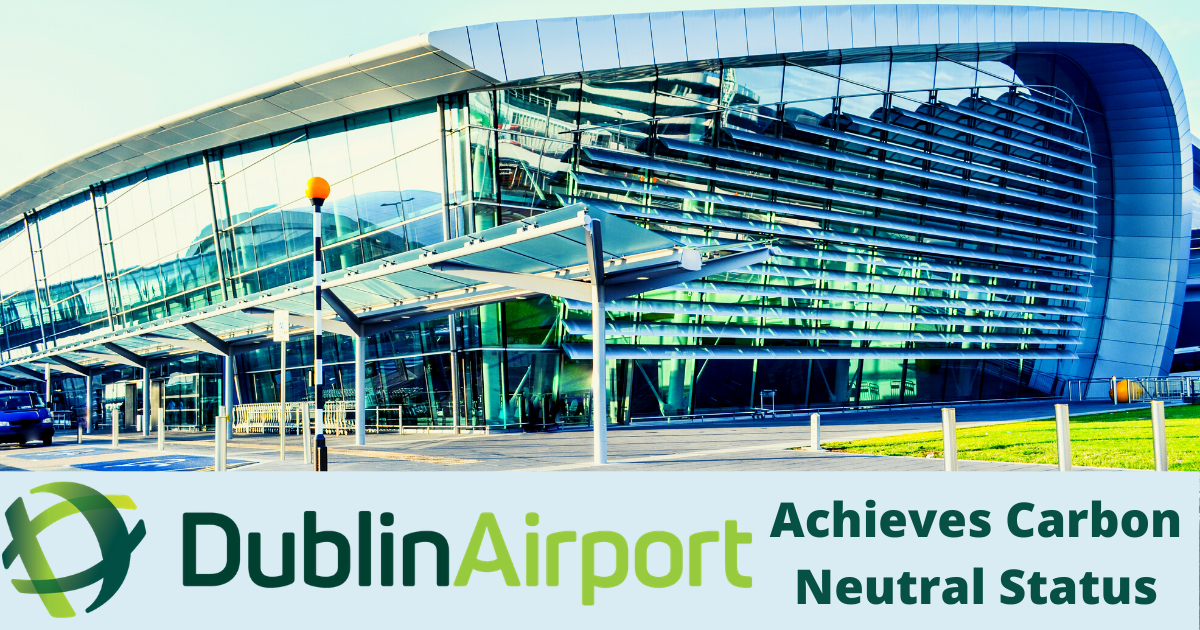Dublin Airport Achieves Carbon Neutral Status

After extensively reducing and offsetting carbon emissions in recent years, Dublin Airport has been recognised as Ireland’s first airport to achieve carbon neutral status by the Global Airport Carbon Accreditation – a global carbon management certification programme for airports that independently assesses and recognises the efforts of airports to manage and reduce their carbon emissions.
According to the Global Sustainable Tourism Council, a carbon neutral status is given when “net zero carbon emissions are achieved by balancing a measured amount of carbon released with an equivalent amount sequestered or offset, or buying enough carbon credits to make up the difference.”
Dublin airport states that their carbon footprint was reduced by 12% between 2018 and 2019 and has reduced its overall carbon emissions by 25% between 2013 and 2019, despite a 63% increase in passenger numbers during the same period.
Dublin Airport has commented on the introduction of a wide range of energy management measures in recent years that allow it to monitor and improve its overall energy use across the campus. The use of building management systems, the installation of efficient LED lighting, a pilot solar farm project and a range of other measures have all helped the airport to significantly reduce its overall energy consumption.
In 2019, Dublin Airport had reduced its energy consumption levels by 48% compared to the average consumption levels in 2006-2008.
Commenting on their achievement, Dublin Airport Managing Director Vincent Harrison stated: “Dublin Airport is committed to minimising its impact on the environment and achieving carbon neutrality is a hugely important milestone on that journey. “We have been working tirelessly to reduce the amount of energy that we use at the airport for many years and are very pleased with the formal recognition of carbon neutral status. But carbon neutrality is not enough. We must go significantly further, and we are dedicated to doing that. We plan to reduce our overall energy consumption by a further 30% by 2030 and we’re committed to becoming net zero for our carbon emissions by 2050 at the latest.”
Unlike carbon neutrality, activities using net zero carbon means that no carbon emissions are being produced. One way this can be achieved is through renewable resources. Dublin Airport’s future plans include moving all its light vehicle fleet to Low Emission Vehicles (LEV) by 2024 and building a second solar farm on campus, with the potential to generate up to 7.5 megawatts of power.
To achieve its Level 3+ carbon neutrality status, Dublin Airport had to work to reduce CO2 emissions from the sources under its control as much as possible and to compensate for the remaining residual emissions through investment in internationally recognised high-quality carbon offsets. Dublin Airport has been working with the global climate finance and carbon neutrality specialist Natural Capital Partners to purchase carbon credits from an improved water infrastructure project being undertaken by Irish NGO Vita in East Africa. The credits provide essential funds to restore community water points and enable easy access to clean water for rural families in Ethiopia and Eritrea.
By drilling new boreholes or repairing existing ones, communities no longer need to boil their water to purify it and this reduces pressure on local forests – the main source of firewood – and reduces greenhouse gas emissions.
Dublin Airport is Ireland’s main international gateway and plays a key role in the Irish economy. The connectivity it provides underpins Irish trade, tourism, and foreign direct investment. According to a 2019 Economic Impact Study, Dublin Airport supports and facilitates almost 130,000 jobs in the Republic of Ireland and generates €9.8 billion in Gross Value Added (GVA) to the Irish economy.
Dublin Airport achieving carbon neutrality is a huge accolade and will hopefully influence other airports around Ireland and abroad, as well as businesses from the tourism, travel and hospitality sector, to reduce their emissions and follow their carbon neutral footsteps.


